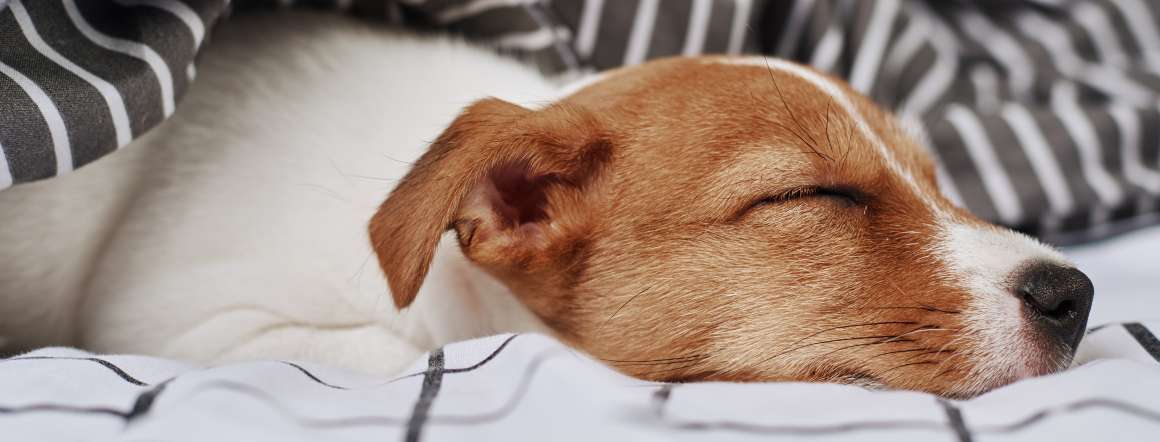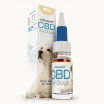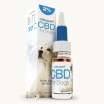Can Dogs Have Sleep Apnea?
Last updated:
Published:
Can dogs have sleep apnea? Many pet owners have wondered if their beloved four-legged friends can suffer from sleep apnea, particularly those with pooches that snore loudly or appear to battle for breath while sleeping. Just like humans, our furry friends can indeed develop sleep apnea, a condition characterized by intermittent pauses in breathing during sleep.
Contents:
- Understanding Sleep Apnea in Dogs
- Recognizing Signs of Sleep Apnea in Your Dog
- Causes and Risk Factors for Canine Sleep Apnea
- Dietary Management for Dogs with Allergies & Weight Issues
- Breeding Practices and Their Impact on Brachycephalic Breeds' Health
-
FAQs in Relation to Can Dogs Have Sleep Apnea
- Can dogs have sleep apnea?
- What are the signs of sleep apnea in dogs?
- How common is sleep apnea in dogs?
- What are some treatments for sleep apnea in dogs?
- Can CBD products help with sleep apnea in dogs?
- Are there any medications for sleep apnea in dogs?
- What are some other tips for improving a dog's sleep?
In this comprehensive guide, we will delve into the specifics of dog sleep apnea - from understanding what obstructive and central types are to how they affect your dog's health. We'll also explore common signs of this disorder in dogs and the potential consequences if left untreated.
Beyond symptoms recognition, we’ll discuss allergies and obesity as risk factors for canine sleep apnea. Particularly important is our section on breed-specific predispositions where you'll learn why certain breeds are more prone than others. Can dogs have sleep apnea due to dietary issues or breeding practices? You'll find out soon enough.

Understanding Sleep Apnea in Dogs
Dogs can suffer from sleep apnea just like humans. This condition affects their breathing during sleep and can lead to serious health issues if left untreated. The most common form of this disorder seen in dogs is obstructive sleep apnea.
What is Obstructive Sleep Apnea?
Obstructive sleep apnea (OSA) occurs when a dog's airway gets blocked, usually due to internal structures within the nose or throat collapsing while they sleep. This causes them to stop breathing momentarily, leading to lower oxygen levels in their blood and disrupting their natural sleeping pattern.
Diagnosing OSA in dogs isn't as straightforward as it is with humans because our furry friends cannot communicate about symptoms such as feeling tired or experiencing headaches upon waking up.
How Does It Affect Dogs?
Sleep apnea not only disrupts your dog's restful night but also has potential long-term effects on their overall health. When your pup has a bout of OSA, their pulse rate drastically decreases, which may result in diminished oxygen saturation levels throughout the body, leading to exhaustion and listlessness over time.
Besides affecting the quality of life negatively by making your canine companion feel constantly tired despite getting enough hours of shut-eye each day, severe cases could potentially cause damage to vital organs, including the brain, due to reduced supply of oxygenated blood during these episodes where they stop breathing temporarily at night.
The Impact on Their Daily Life
- Mood Changes: Just like us humans who tend to get cranky after a poor night's rest, our pets experience mood swings resulting from a lack of proper sleep caused by recurring instances of obstructed airflow while asleep.
- Inactivity: A constant state of exhaustion leads to a decreased activity level among affected animals, meaning less playtime and more nap times throughout the day, which isn't necessarily a good thing, especially considering the importance of regular exercise in maintaining a healthy weight and preventing obesity-related diseases such as diabetes, heart disease, etc.
Recognizing Signs of Sleep Apnea in Your Dog
Don't let your furry friend suffer from sleep apnea. Early identification of symptoms can help manage this condition better. Signs to look out for include loud snoring, gasping or choking while sleeping, excessive daytime sleeping or tiredness, and irritability. Left untreated, sleep apnea can have serious health consequences such as high blood pressure and cardiovascular disease.
Common Symptoms of Canine Sleep Apnea
Dogs suffering from sleep apnea exhibit signs similar to those seen in humans:
- Loud Snoring: If your dog's snoring seems unusually loud or if they struggle for breath during sleep, it might be a sign of obstructive sleep apnea.
- Nocturnal Choking: Episodes where your dog appears to choke or gasp for air during sleep can indicate an obstruction in their airway.
- Frequent Awakening: A dog with sleep apnea will often wake up frequently throughout the night due to interrupted breathing patterns.
- Irritability & Fatigue: Dogs affected by this disorder may also show signs of being overly sleepy during daytime hours, seeming irritable, or displaying decreased activity levels due to lack of restful sleep at night.
Consequences of Untreated Sleep Apnea
If left untreated, canine obstructive sleep apnea can have serious health implications over time. Prolonged periods without adequate oxygen supply can cause hypertension (high blood pressure), which puts extra strain on your pet's heart and other organs. Oxygen deprivation can also trigger stress responses within the body, leading to potentially fatal complications, including congestive heart failure. Beyond these physical impacts, there are behavioral changes too that you might notice - increased anxiety levels owing perhaps largely because dogs aren't getting enough quality restorative nighttime rest so they're constantly feeling tired stressed out all day long. So make sure you keep close watch any sudden shifts mood behavior especially if combined other aforementioned warning signals indicating possible presence underlying respiratory issue affecting overall wellbeing beloved four-legged friend.
Causes and Risk Factors for Canine Sleep Apnea
It's important to understand the causes and risk factors to manage the condition effectively and ensure your furry friend gets quality sleep.
Allergies as a Cause
Dogs with allergies often have inflamed airways that can lead to obstruction during sleep. The airway inflammation which can cause snoring in dogs could be due to various sources, such as airborne particles, food sensitivities or even medications. If you notice your dog's snoring worsens during particular seasons or after eating specific foods, it might be worth discussing potential allergy testing with your vet. The American Kennel Club provides more information on canine allergies here.
Obesity Related Risks
Obesity is another significant risk factor for canine sleep apnea, just like in humans. Excess weight puts pressure on the throat muscles, leading them to collapse while sleeping, causing obstructive breathing patterns characteristic of this disorder. Therefore, maintaining an optimal weight through regular exercise and a balanced diet should not be overlooked when addressing this issue.
Breed-Specific Predispositions
Certain breeds, such as Bulldogs, Pugs and Shih Tzus with their shortened nasal passages due to brachycephaly, are predisposed to developing obstructive sleep apnea. These dogs' shortened nasal passages make them prone to respiratory issues, including obstructions while sleeping. However, obstructive sleep apnea is not solely determined by breed; diet and exercise can also be significant contributors.
While understanding these risks helps identify potential triggers behind your pet's disrupted slumber pattern, remember that each case varies significantly depending on individual health status, making professional veterinary advice indispensable.
With increased awareness about associated health risks, especially concerning respiratory issues arising from breeding practices resulting in brachycephalic breed traits, ethical implications surrounding these practices have come under scrutiny recently, despite these breeds being popular choices among pet owners worldwide today because of their friendly demeanors.
By recognizing early signs coupled with effective management strategies, you can ensure that regardless of breed or other predisposing conditions, every pup gets its fair share of sweet dreams.
Dietary Management for Dogs with Allergies & Weight Issues
As a conscientious pet guardian, it is essential to understand that dietary choices can profoundly affect the well-being of your canine companion, particularly in cases where allergies or obesity may be causing sleep disorders such as obstructive sleep apnea. This is especially true for dogs with allergies or obesity, which can lead to sleep disorders like obstructive sleep apnea.
Hypoallergenic Diet Benefits
A hypoallergenic diet can benefit dogs with allergies. These diets minimize allergens that could trigger allergic reactions in sensitive pups. For example, some dogs might be allergic to certain proteins found in common pet foods. In such cases, switching to a hypoallergenic diet containing novel protein sources (like venison or rabbit) and carbohydrates (such as sweet potatoes or peas) could help manage their allergy symptoms better.
Moreover, these diets also contain fewer ingredients overall, reducing the chances of an adverse reaction occurring due to exposure to multiple potential allergens present in regular commercial dog food products.
Dietary Recommendations for Overweight Dogs
If your furry friend struggles with weight issues leading to sleep apnea, managing their dietary intake becomes even more critical. Obesity increases the risk of various health problems, including respiratory difficulties that exacerbate sleep disorders among affected pets.
- Balanced Nutrition: A balanced diet rich in high-quality proteins but low in fats and sugars is crucial. Excessive caloric intake leads to unhealthy weight gain among pets, just like humans.
- Serving Size Control: Paying attention to what and how much you're feeding your dog at each mealtime is equally important. Even when consumed in large amounts, nutritious food can still result in unwanted weight gain.
- Frequent Exercise: Regular physical activity helps burn off excess calories while keeping your pet fit and active, reducing risks associated with sedentary lifestyles.
Under vet supervision, if needed, these recommendations would go a long way toward maintaining optimal body weight, helping alleviate related health complications.
Remember, every canine has distinct dietary requirements based on characteristics like age, breed and size. Always consult your vet before making any major changes to their dietary regimen, especially if they have underlying medical conditions requiring special care considerations.
Breeding Practices and Their Impact on Brachycephalic Breeds' Health
With a wide range of dog breeds available, the health implications of certain breeding practices for brachycephalic dogs with short noses and flat faces - such as Bulldogs, Pugs, and Boston Terriers - have become increasingly concerning. However, some breeding practices have raised concerns due to their impact on certain breeds' health - particularly brachycephalic dogs.
Brachycephalic dogs are those with short noses and flat faces like Bulldogs, Pugs, and Boston Terriers. While these features may be aesthetically appealing for many pet owners, they can unfortunately lead to serious health problems.
The Health Risks Associated with Brachycephalic Traits
Respiratory issues: The most significant concern is Brachycephalic Obstructive Airway Syndrome (BOAS). This condition arises from the physical structure of brachycephalic breeds that includes narrow nostrils and elongated soft palates making breathing difficult for them.
Sleep apnea: These upper airway abnormalities also contribute towards developing sleep disorders in these breeds such as obstructive sleep apnea where the dog's airways become partially or fully blocked during sleep leading to symptoms like loud snoring or gasping for breath.
Risk of heatstroke: Dogs primarily cool down by panting which requires efficient airflow through nasal passages. For brachycephalics though this process becomes challenging thereby increasing susceptibility towards heatstroke especially during hot weather conditions.
Ethical Implications of Breeding Practices
The ethical implications surrounding breeding practices that result in brachycephalic traits have come under scrutiny recently given increased awareness about potential associated health risks. Critics argue that intentionally breeding dogs with traits causing them discomfort or pain is unethical while proponents maintain selective breeding helps preserve specific breed characteristics loved by people around the globe.
Potential Solutions to Mitigate Health Issues in Brachycephalic Breeds
- Dietary management: A balanced diet plays an important role in maintaining your dog's weight thus reducing risk factors contributing towards the development of conditions like obesity-related sleep apnea among other things.
- Veterinary intervention: In severe cases, vets might recommend surgical procedures aimed at widening nasal passages helping your furry friend breathe easier.
- Careful selection: If you're considering adopting a brachycephalic breed, ensure you choose responsibly sourced puppies from reputable breeders who prioritize animal welfare over aesthetics alone.
FAQs in Relation to Can Dogs Have Sleep Apnea
Can dogs have sleep apnea?
Yes, dogs can suffer from sleep apnea, especially brachycephalic breeds with short noses and flat faces, which can cause an obstruction in their airway during sleep.
What are the signs of sleep apnea in dogs?
Signs of sleep apnea in dogs include loud snoring, gasping for air during sleep, restless sleep, and excessive daytime sleepiness.
How common is sleep apnea in dogs?
The prevalence of sleep apnea in dogs is not well documented, but it is more common in certain breeds, such as Bulldogs, Pugs, and Boston Terriers.
What are some treatments for sleep apnea in dogs?
Treatments for sleep apnea in dogs may include weight loss, changes in sleeping position, surgery to remove obstructions, and the use of continuous positive airway pressure (CPAP) machines.
Can CBD products help with sleep apnea in dogs?
While there is limited research on the use of CBD products for sleep apnea in dogs, some pet owners have reported success in using CBD oil to help their dogs sleep better.
Are there any medications for sleep apnea in dogs?
There are currently no medications specifically approved for the treatment of sleep apnea in dogs, but some medications may be prescribed to address underlying conditions that contribute to sleep apnea, such as allergies or respiratory infections.
What are some other tips for improving a dog's sleep?
Other tips for improving a dog's sleep include providing a comfortable sleeping environment, establishing a regular sleep routine, and ensuring that your dog gets enough exercise during the day.












